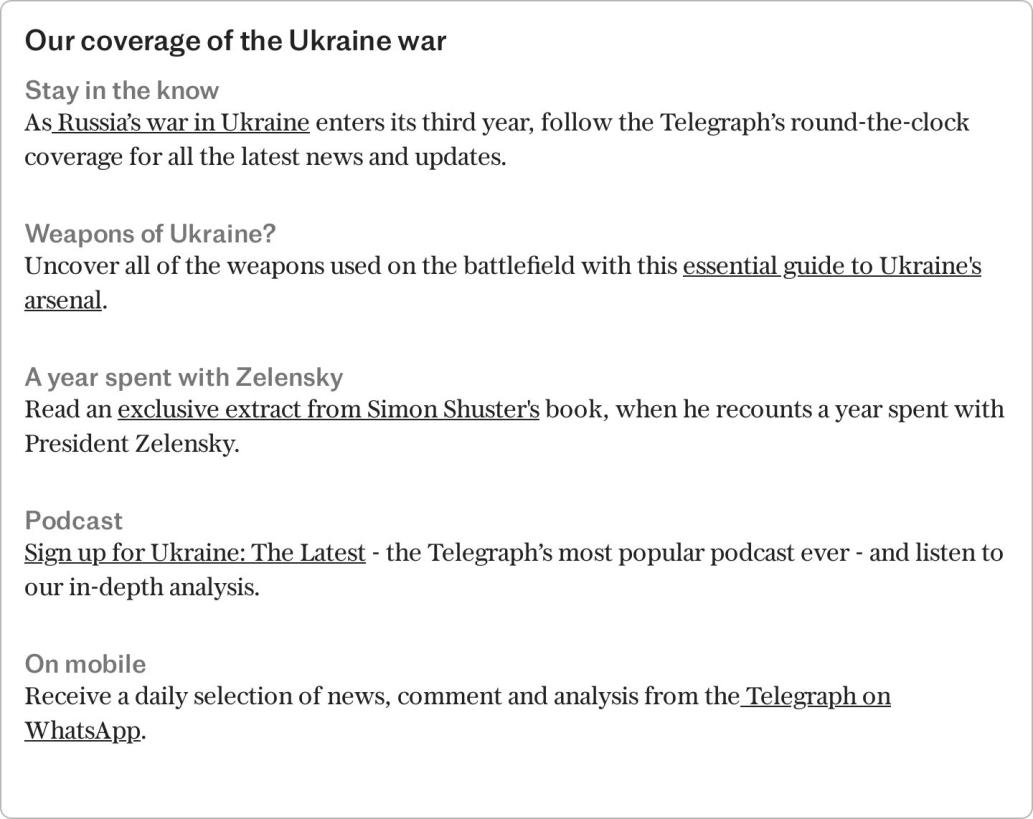Putin wants ceasefire in Ukraine, Kremlin sources say

Vladimir Putin has hinted at a ceasefire in Ukraine as Kremlin sources said the Russian leader believes he has taken enough territory to present as a victory.
Moscow aides told Western journalists that Putin is ready for a deal to “freeze the war” along the current front lines.
They also admitted that Russia may not be able to make a significant breakthrough in the fighting without mass mobilisation, which Putin opposes.
Offers of a ceasefire will be viewed with heavy scepticism in Ukraine and the West, which is gearing up for their own peace summit, as well as G7 and Nato talks - all of which Russia is excluded from.
But the comments on the risks of mass mobilisation for Russia offer a rare glimpse into anxiety about the war within the Kremlin.
In briefings given to the Reuters news agency, Kremlin sources said Putin blamed Volodymyr Zelensky for dodging peace talks as he was prepared to order his advancing armies to halt.
“Putin can fight for as long as it takes, but Putin is also ready for a ceasefire - to freeze the war,” said one of the sources.
Mr Zelensky has said that he will not negotiate with Putin and has pledged to retake all land captured by Russia.
Putin is also in his strongest position since his initial invasion of Ukraine in February 2022. His armies are on the front foot on battlefields in Ukraine and his industry is outproducing Ukraine’s allies for arms and weapons, vital in a war that has descended into a slugging match.
The Reuters sources, though, said that Putin was genuine about pushing for a ceasefire because he has become wary of the cost of the war and believes that he can sell territorial gains as a “win” to Russians.
“Putin will say that we won, that Nato attacked us and we kept our sovereignty, that we have a land corridor to Crimea, which is true,” said a source.
Three sources said Putin understood any dramatic new advances would require another nationwide mobilisation, which he did not want, with one source, who knows the Russian president, saying his popularity dipped after the first mobilisation in September 2022.
Ceasefire contradicts nuclear push
Russia now occupies around 18 per cent of Ukraine, including Crimea which it annexed in 2014, but the Kremlin has failed to capture the whole of any other region despite promoting the conquest of the eastern region of Donbas as a priority.
This month, Russian forces launched an attack towards Kharkiv in the northeast of the country for the first time since it was routed from the outskirts of the city in 2022.
Putin has previously said that he is interested in finding a ceasefire to the fighting in Ukraine, including during a visit this month to China, Russia’s most important economic ally.
China has promoted a 12-point peace plan to the war in Ukraine which has been widely discredited.
Calls by Putin for a ceasefire in Ukraine also appear to contradict his increasingly aggressive posture around Russia’s nuclear weapons.
This week, Russian forces practised using a tactical nuclear weapon on a mock battlefield and Putin also visited Belarus for talks focused on Russian nuclear weapons stationed there since last year.
Analysts said the Kremlin comments may be designed to spread dissent among some of Ukraine’s European allies who are growing tired of the cost of backing Kyiv.
Samuel Ramani, an Associate Fellow at the Royal United Services Institute in London, said: “Putin is effectively harnessing the ‘immediate ceasefire’ component of China’s peace proposal to present a good faith image, knowing that Ukraine will not accept this.”



